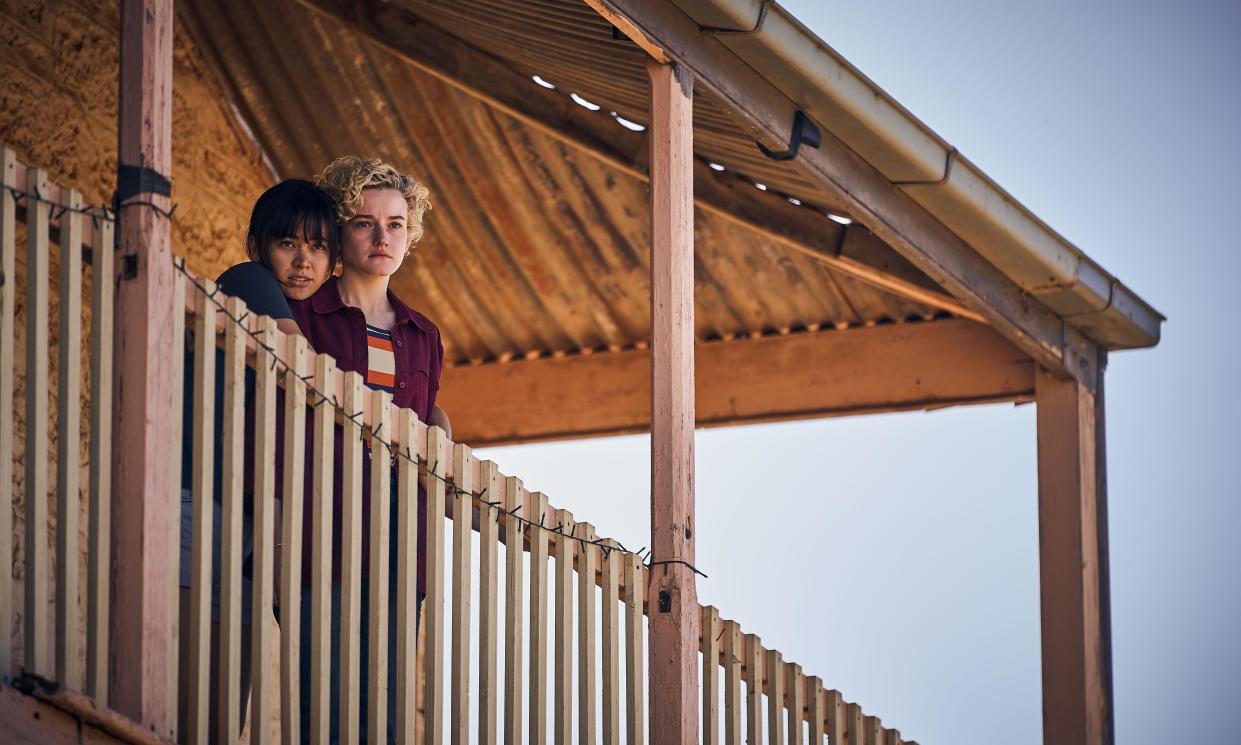The Royal Hotel review – feminist thriller starts strong but can’t stay the course

The hoary sub-genre that is “attractive American tourists find something nefarious on their travels” is given a vigorous polish in thoughtful thriller The Royal Hotel, a film light on exploitation and heavy on interrogation.
Related: Nyad review – swim biopic lifted by Annette Bening and Jodie Foster
It’s an intriguing follow-up for writer-director Kitty Green, whose last film The Assistant was a simple yet stinging drama about a young woman, played by Julia Garner, working, and cleaning up, for a predatory Weinstein-like figure. Green’s approach to the subject was defter than most, an unusual way into a story most of us already knew far too much about, and there’s a similar sensitivity here for the most part, grounding a potentially schlocky situation. Garner returns as Hanna, joined by Glass Onion’s Jessica Henwick as Liv, two women running out of money on their travels in Australia, forced to take whatever work is available. Their only option is a pub in a remote mining community, run by Hugo Weaving’s crotchety inebriate, with no wifi but plenty of horny locals.
Green’s uneasy slow-burn as the two women smile off an escalation of misogynistic microaggressions, is rooted and believable (it’s loosely based on a 2017 documentary), a forced playfulness with their lairy clientele a necessary tool of survival. It’s a perceptive look at the realities of working at a service job as an outsider when class and gender come into play, and the difficulties of performance that then leads to, an impossible modulation, role-playing on a knife-edge. The two British women who came before them, drunkenly passing the baton, show a more permissive attitude, playing along with a brash lack of sexual inhibition but the new pair are less comfortable with the dynamic, Hanna quickly painted as the party-pooper, a tiresome procession of men just asking her to smile more.
Despite the increasing ugliness of the situation, the script, from Green and Oscar Redding, avoids the broadest of strokes, showing us specific variations in the men they encounter, that trouble can come in many forms, some of it more tolerable yet all of it exhausting. It can also come in more initially deceptive packaging, such as Babyteeth star Luke Holland’s handsome flirt and one of the film’s most horribly well-orchestrated moments is an aborted alcohol-fueled sex scene with him and Garner, reminiscent of the one in the film adaptation of Cat Person. Both scenes carry uncomfortable and unfairly imbalanced questions – why am I here, is this my fault, what should I do, what do I owe someone, how do I get out safely – and it’s in these chillier moments that the film really gets under the skin.
But like that film it also loses its power as it thunders towards a spotty finale, not quite as dramatically here, but the initial tension, of which there was so much, dissipates as the film struggles to figure out how far it should lean into its genre trappings. The decision-making becomes harder to justify, the circumstances become harder to believe and the final punch of an ending becomes impossible to buy, a bravura visual (the film looks sensational throughout) but one that would only make sense had the film really gone full thriller. Garner and Henwick are never anything less than convincing, the latter especially, and the film is often at its most interesting when exploring the tiring dynamic of being the responsible friend. I’d argue the last act could have benefited from more of this knottiness but it’s more texture than one would usually find in a film such as this.
It’s this trap though that becomes a blessing and curse, the film so much better than most ‘tourists find trouble abroad’ horrors yet at times thinner and less believable than a drama in the same setting. It’s everything and nothing at once although for a while, it’s really something.
The Royal Hotel is screening at the Toronto film festival and will be out in US cinemas on 6 October

 Yahoo Movies
Yahoo Movies 
